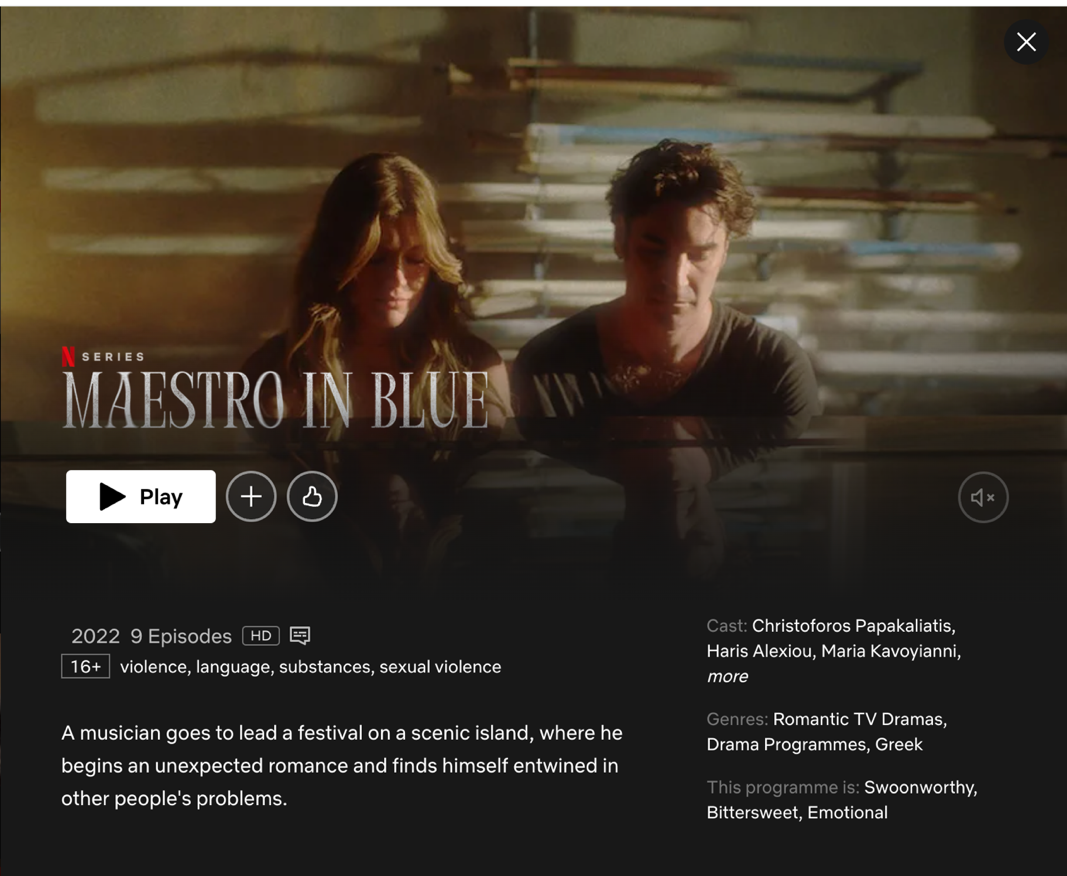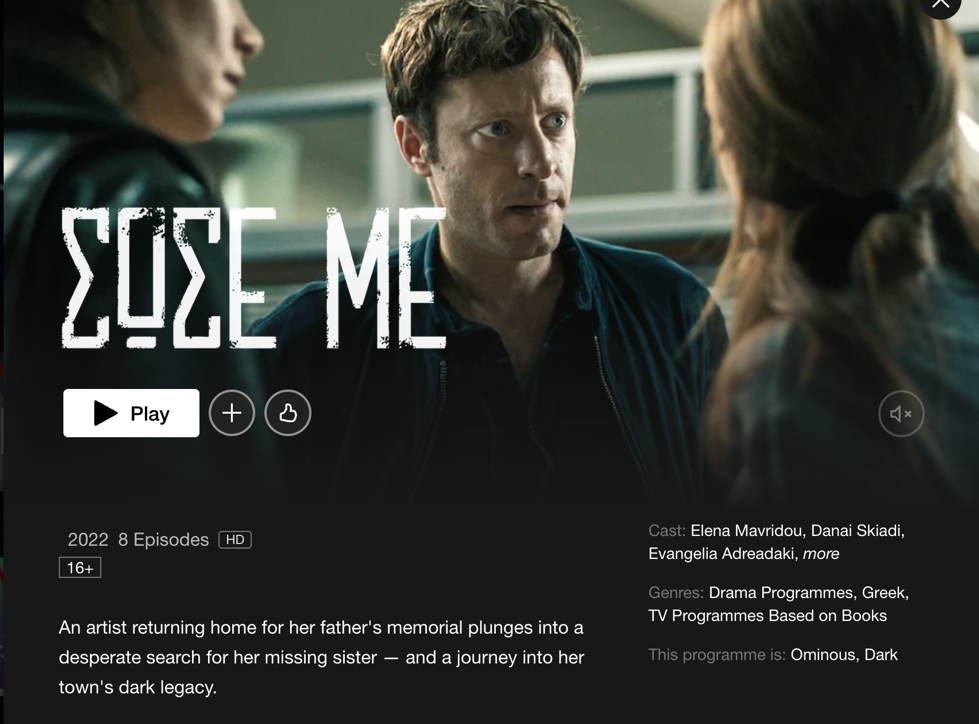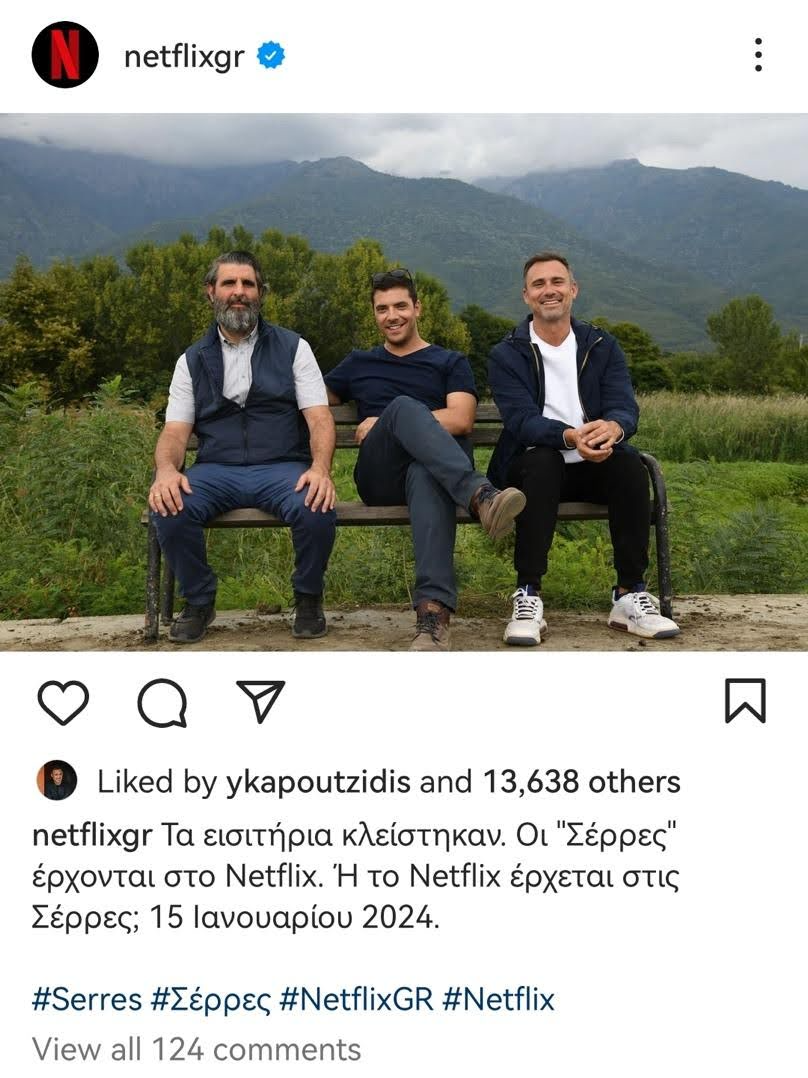Why Being A ‘Netflix Nation’ Matters – And To Whom
Georgia Aitaki / Karlstad University

Christopher Papakaliatis is one of Greek television’s most notable creators and his latest series, Maestro in Blue, has played a pivotal role in turning Greece into a Netflix nation (Lobato 2019). Supported by the National Centre of Audiovisual Media and Communication (EKOME) and initially aired on the private television channel MEGA TV, Maestro in Blue made history on 19 December 2022, by becoming the first Greek TV series to appear on Netflix, with a second and third season currently in production. What this development (or achievement, for some!) signifies is a shift where Greece is no longer a nation that just consumes televisual content coming from the streaming giant but also contributes to the platform’s catalogue with locally produced shows.
Since 15 January 2024, Greek Netflix has expanded its catalogue with two additional mini-series: Serres (ANT1+, 2022-2024) and Sose Me/Save Me (ANT1+, 2022-2023). These additions have been met with enthusiasm by critics and viewers alike, as well as by the industry itself. Viewed by some as potential gamechangers and by others as sources of national pride, these representatives have (hopefully) opened the way for a more extroverted television production culture in Greece, one that involves broader creative collaborations and production practices designed to resonate with a transnational perspective and facilitate global distribution. But why exactly does being a Netflix nation matter? And to whom?
Netflix has been conceptualized as a transnational broadcaster that moves content away from its national context and engages with, while also influencing, global audiences. Mareike Jenner (2023) suggests that transnationalism for Netflix involves intricate processes of domestication, cultural interchange, and interactions with (mainly) US imports and national media systems. The complex interactions all take place within the realms of the internet television. These dynamics are often examined through the lens of glocalization, highlighting the interplay between global and local elements (Ibid.), as well as through concepts like cosmopolitanism, which entails a loosening of connections between nation, territory, and culture (Chalaby 2023). Central to these discussions is also the examination of how technological infrastructures serve as mechanisms for shaping global order (Ibid., 173-174):
It is no longer place but technology that determines the fate of stories and ideas, and internet delivery has loosened the ties between TV culture and national culture more than ever. By rendering TV cultures more cosmopolitan, global streamers are helping to bring about a new transcultural order.

As major players in the global SVOD landscape, platforms like Netflix not only distribute content but also serve as significant funders and creators. One prominent tactic is Netflix’s investment in original programming, which aims to cater to local viewers while also appealing to international audiences, leveraging its cosmopolitan appeal to transcend borders and resonate with diverse viewerships (Lotz 2022). Specifically with regard to licensing/commissioning and the case of Maestro in Blue, Netflix Italia manager of content acquisitions Veronica Vitali has described the series in question as exactly the kind of content that Netflix is looking for (Vourlias 2022):
‘Maestro’ is a great example of… a show that feels very local, very Greek. But at the same time, it touches on universal themes like forbidden love, human nature, conflicts, family […] This is what we hope will make people connect with it around the world.
From a production perspective, glocalization efforts and projects generally aim at satisfying both global and local audiences, while making sure the platform’s content remains rich, diverse, and attractive. Research has emphasized that such practices have functioned as a significant boost for local production cultures; in Spain, for instance, SVOD services have enabled a significant rise in the production of series, with the country emerging as a notable contender in the global market offering high-quality fiction produced on manageable budgets. It has been argued that such developments facilitate the reinvention of established production models while retaining successful elements, creating potentially the circumstances for a broader boost of European TV fiction (Castro & Cascajosa 2020).
Within these processes, engaging and attracting local audiences appears to remain a primary goal. Research has shown that social media play a significant role in reaching local audiences; various branding and promotional activities, such as the use of cultural and popular references, employed on social media platforms are not only a tool for navigating increasing competition among online and linear, big and small, audiovisual players, but also as strategies implemented to create locally specific profiles within national markets (Navarro & Monclús 2021).

At the same time, extant literature provides recurring reminders of the need for a deeper understanding of local taste(s). We know that local audiences feel included and valued when represented in global libraries (Lotz 2022), but the reception of local content remains a complex matter. In a study of Netflix audiences in Turkey, for example, the findings made the case for multilayered local tastes; Turkish users of the platform express dissatisfaction with Netflix’s cautious approach to investing in local content, which often resembles conventional network TV series, contrary to the diverse programming they expect from SVOD services. Additionally, they critique Netflix originals for perpetuating stereotypical portrayals of the local culture, particularly in Turkish productions where the country is often depicted as a mystical tourist destination (Ildir & Celik Rappas 2022).
Netflix’s glocalization initiative can be described as a broad approach to financing media content, aiming to meet the preferences of specific local audiences while also assembling a repository of local content for distribution across various international markets. Literature on the subject notes that maintaining local authenticity and ensuring high production standards are essential criteria for content to be considered for inclusion in the global catalogue. At the same time, issues related to and regulated by media policy should not be underestimated. Against the backdrop of all of the above, we need to continuously keep an eye on how various (local) audiences engage with televisual texts and global streaming platforms (Wayne & Sandoval 2023). As big players such as Netflix address, as well as shape, global audiences, it is imperative that we continuously explore the uses, gratifications and disappointments that audiences register and experience, as well as the power of audiences in formulating needs and expectations in a highly dynamic transnational media landscape.
In conclusion, the emergence of Greece as a Netflix nation holds significance for multiple stakeholders. For creators like Papakaliatis, it represents an opportunity to showcase their work on a global platform. For the Greek television industry, it signals a potential shift towards bigger international visibility and increased opportunities for distribution. Moreover, for audiences, it means access to diverse content that reflects cultural specificities on a global scale. Among other things, being a Netflix nation matters as it signifies a broader cultural and industrial shift, renewing perceptions of Greek creativity and storytelling on a global stage, as well as shaping new visibility regimes. A deep(er) dive into the role of local audiences for transnational media flows can definitely enrich our understanding of Netflix’s glocalization projects in various types of media markets, including questions surrounding catering to diverse cultural preferences and sensibilities, enhancing authenticity and relatability, as well as bolstering local talent and visibility.
Author’s note: The author would like to thank the Centre for Geomedia Studies at Karlstad University, Sweden for the support.
Image Credits:
- Maestro in Blue’s entry in the Netflix catalogue – the first ever Greek TV series to be launched on Netflix. Source: Author’s screenshot from Netflix.
- Sose Me’s entry in the Netflix catalogue, currently available on Netflix Greece. Source: Author’s screenshot from Netflix.
- The Greek Netflix Instagram account welcomes yet another Greek TV series, Serres. The caption reads: ‘The tickets are booked. “Serres” comes to Netflix. Or Netflix comes to Serres? 15 January 2024.’ Source: Author’s screenshot from Netflix Greece @netflixgr.
Castro, Deborah, and Concepción Cascajosa. “From Netflix to Movistar+.” Journal of Cinema and Media Studies 59, no. 3 (2020): 154-161.
Chalaby, Jean. Television in the Streaming Era: The Global Shift. Cambridge: Cambridge University Press, 2023.
Ildir, Asli, and İpek A. Celik Rappas. “Netflix in Turkey: Localization and audience expectations from video on demand.” Convergence 28, no. 1 (2022): 255-271.
Jenner, Mareike. “Netflix and the Re-Invention of Transnational Broadcasting.” In Netflix and the Re-Invention of Television, edited by Mareike Jenner, 213-25. Cham: Springer, 2023.
Navarro, Celina, and Belén Monclús. “The curation of European Netflix catalogues on social media: The key role of transnational and local cultural traits.” Critical Studies in Television 16, no. 4 (2021): 347-374.
Lobato, Ramon. Netflix Nations: The Geography of Digital Distribution. New York: NYUP, 2019.
Lotz, Amanda D. Netflix and Streaming Video: The Business of Subscriber-Funded Video on Demand. Cambridge: Polity Press, 2022.
Vourlias, Christopher. “With a Boost from Netflix and Global Buyers, Greek Drama Readies to Go Global.” Variety, 11 November 2022, 2022. https://variety.com/2022/tv/global/netflix-maestro-greek-drama-series-1235430170/.
Wayne, Michael L., and Ana C. Uribe Sandoval. “Netflix original series, global audiences and discourses of streaming success.” Critical Studies in Television 18, no. 1 (2023): 81-100.